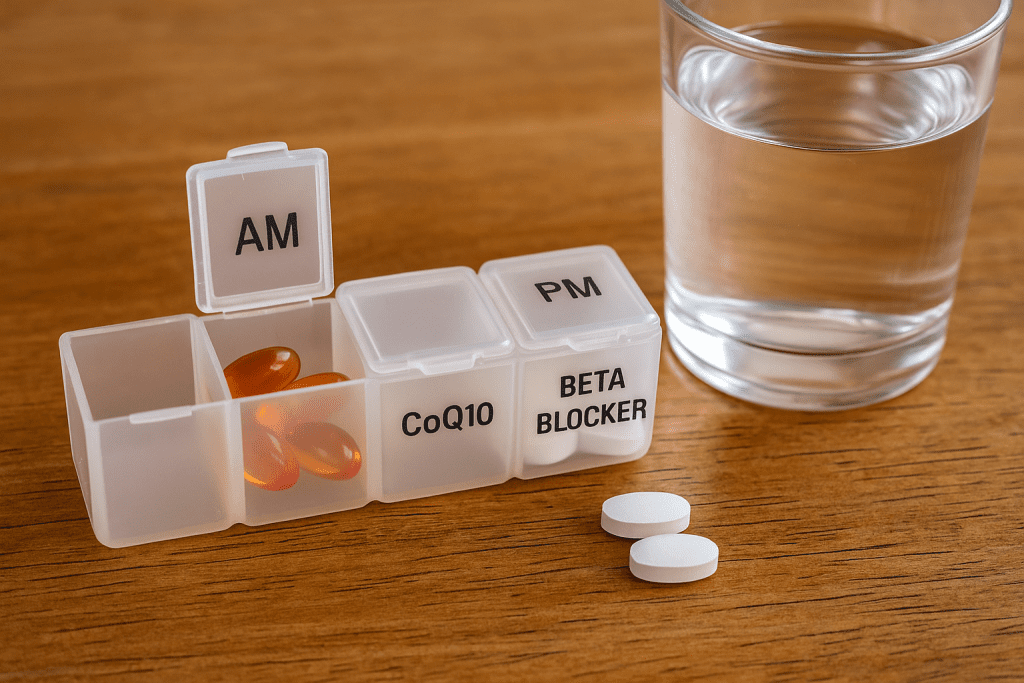Combining CoQ10 with beta blockers can sometimes cause dizziness – but why? This article breaks down how these substances interact, what research shows about their combined effects on blood pressure, and practical strategies for safer use.
Whether you’re managing heart medication side effects or exploring supplement synergy, we’ll help you navigate the risks and benefits of this common pairing.
Quick Answer: Can CoQ10 and Beta Blockers Cause Dizziness?
| Question | Summary Answer |
|---|---|
| Can CoQ10 cause dizziness? | Yes – it may lower blood pressure too much in sensitive individuals |
| Do beta blockers cause dizziness? | Yes – especially when starting treatment or increasing the dose |
| Is the combo riskier? | Possibly – overlapping blood pressure effects may intensify dizziness |
| How to reduce dizziness? | Adjust timing, dosage, and always consult your doctor |
CoQ10 and Beta Blockers: How They Work Together
CoQ10 (coenzyme Q10) is a naturally occurring antioxidant that plays a critical role in energy production, particularly in the heart. Beta blockers are heart medications that slow heart rate and reduce blood pressure by blocking adrenaline’s effects. While both support cardiovascular health, their combined effects can sometimes be too much for sensitive individuals.

CoQ10’s Cardiovascular Benefits
CoQ10 helps generate cellular energy (ATP) in the mitochondria and supports endothelial function. It’s been studied for its ability to reduce blood pressure, improve heart failure symptoms, and counteract statin-induced CoQ10 depletion.
- Blood pressure: A 2023 review in PMC found CoQ10 supplementation reduced systolic blood pressure by around 5 mmHg in people with metabolic conditions.
- Endothelial function: Research in Circulation linked CoQ10 to improved nitric oxide bioavailability, enhancing vessel relaxation.
Beta Blockers and Their Mechanism
Common beta blockers like metoprolol, bisoprolol, and propranolol work by slowing the heart and reducing blood pressure. However, older versions like propranolol may inhibit CoQ10-dependent enzymes like NADH-oxidase, potentially leading to reduced mitochondrial energy production and more side effects.
- PubMed reports propranolol shows the highest inhibition, while metoprolol has milder effects, and timolol negligible.
Understanding this mechanism helps explain why dizziness may occur more frequently in certain beta blocker-CoQ10 combinations.
Dizziness: Shared Side Effect or Synergistic Outcome?
Both CoQ10 and beta blockers can independently cause dizziness. When combined, especially in sensitive individuals or at higher doses, the risk may increase.
CoQ10 and Dizziness
- WebMD and Drugs.com list dizziness and lightheadedness as known CoQ10 side effects.
- Anecdotal accounts report transient dizziness about an hour after taking CoQ10.
- In cases of orthostatic hypotension, CoQ10 has shown mixed effects on blood pressure stability when standing (PubMed).
Beta Blockers and Dizziness
Dizziness is a common side effect when starting beta blockers, especially during dose changes. According to the AAFP, this usually fades as the body adjusts.
Additive Effects on Blood Pressure
When both substances reduce blood pressure, the combined effect may cause hypotension-related symptoms:
- One study in PMC showed CoQ10 improved postural blood pressure drops from -30 mmHg to -7 mmHg, signaling a stabilizing effect in some.
- However, Cochrane reviews note only modest or inconsistent pressure-lowering from CoQ10 alone.
The bottom line: dizziness likely stems from cumulative vasodilatory and heart-slowing effects.
How to Manage CoQ10 + Beta Blocker Dizziness
Not everyone experiences issues, but if dizziness arises, several steps can help.

1. Start Low, Go Slow
Begin with a lower CoQ10 dose (e.g., 50 mg/day) and gradually increase. A Dr. Weil Q&A noted users had fewer symptoms after adjusting brand or formulation.
2. Split the Timing
Taking CoQ10 and beta blockers at different times of day may reduce compounding blood pressure effects. Morning CoQ10 and evening beta blockers, for example, can help.
3. Consult Your Healthcare Provider
Never adjust medications or supplements without guidance. Always inform your provider about your full regimen, especially if symptoms like dizziness arise.
For full supplement tracking and side effect logging, see our best app for tracking vitamin and drug interactions.
4. Consider Beta Blocker Alternatives
If side effects persist, your doctor may switch you to a beta blocker like timolol, which has a minimal effect on CoQ10 metabolism according to PubMed.
Can CoQ10 Actually Help With Beta Blocker Side Effects?
Interestingly, CoQ10 might reduce certain adverse effects of beta blockers, particularly in heart failure patients.
- A trial reported in ESC Cardio called CoQ10 “the first supplement to improve heart failure mortality since ACE inhibitors and beta blockers.”
- Since beta blockers may reduce CoQ10 levels, supplementation could restore mitochondrial function, reducing fatigue or muscle weakness.
This points to potential heart medication supplement synergy in select patient populations – with proper oversight.
Related Safety Concerns
CoQ10 is typically well tolerated, but always consider the broader picture:
- Drug interactions: There are no major contraindications between CoQ10 and metoprolol or bisoprolol according to Drugs.com, but rare individual sensitivities exist.
- Blood pressure interactions: Like with other supplements, timing and dosage matter. See our guide on “Can I take magnesium with blood pressure medication?” and “Potassium supplements and ACE inhibitor dangers”.
- Dehydration or electrolyte loss: Some side effects mimic those of diuretics. Check out our coverage on “Licorice root supplements and diuretic depletion”.
Conclusion: Smart Supplement Strategy
Dizziness can occur when CoQ10 and beta blockers are taken together, mainly due to their overlapping effects on blood pressure and heart rate. The risk varies depending on the type of beta blocker, CoQ10 dose, and individual response. However, with careful monitoring, timing strategies, and medical guidance, many people tolerate the combination well – and some may even benefit.
When in doubt, use a symptom logger for drug-nutrient side effects to track patterns and inform your healthcare team.

